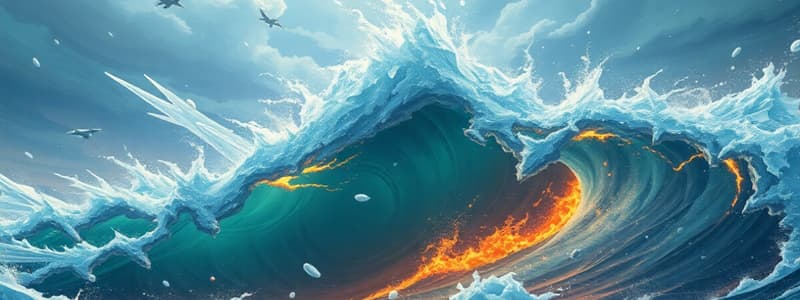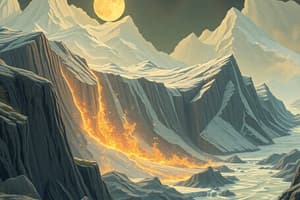Podcast
Questions and Answers
What unusual characteristic did the seismic event triggered by the landslide exhibit?
What unusual characteristic did the seismic event triggered by the landslide exhibit?
- It was associated with volcanic activity.
- It had a slow and constant wave pattern. (correct)
- It occurred only once and then stopped.
- It was brief and sharp like typical earthquakes.
What primarily caused the seismic waves to continue for nine days?
What primarily caused the seismic waves to continue for nine days?
- An aftershock from the initial earthquake.
- Continual volcanic eruptions in the area.
- A failure in the earthquake sensors themselves.
- The back-and-forth motion of a standing wave. (correct)
What was the volume of rock and ice that collapsed into the fjord due to the landslide?
What was the volume of rock and ice that collapsed into the fjord due to the landslide?
- 50 million cubic yards.
- 10 million cubic yards.
- 33 million cubic yards. (correct)
- 20 million cubic yards.
How high was the tsunami triggered by the landslide?
How high was the tsunami triggered by the landslide?
What did the high-resolution sonar survey reveal about the fjord?
What did the high-resolution sonar survey reveal about the fjord?
What underlying issue is linked to the landslide and the subsequent seismic activity?
What underlying issue is linked to the landslide and the subsequent seismic activity?
What phenomenon is the seiche compared to in the explanation given by Dr. Svennevig?
What phenomenon is the seiche compared to in the explanation given by Dr. Svennevig?
What significant event prompted the international investigation by the team of scientists?
What significant event prompted the international investigation by the team of scientists?
Flashcards
Seismic Rumble
Seismic Rumble
A slow, continuous wave that lasts for a long time, unlike the sharp, quick waves of typical earthquakes.
Seiche
Seiche
A large volume of water that oscillates back and forth in a confined space, creating a standing wave.
Tsunami
Tsunami
A massive wave generated by a sudden displacement of water, often caused by events like landslides or earthquakes.
Landslide
Landslide
Signup and view all the flashcards
Glacier
Glacier
Signup and view all the flashcards
Global Warming
Global Warming
Signup and view all the flashcards
Glacier Retreat
Glacier Retreat
Signup and view all the flashcards
Fjord
Fjord
Signup and view all the flashcards
Study Notes
Mysterious Global Seismic Event of 2023
- A sustained, unusual seismic event was detected worldwide in mid-September 2023. This event differed from typical earthquakes, exhibiting a slow, constant wave instead of a sharp signal.
- The rumbling continued for nine days before ceasing.
- Scientists worldwide found this unprecedented.
Origin of the Seismic Event
- An international team of 68 scientists, led by Dr. Kristian Svennevig, traced the event to a landslide and tsunami in East Greenland's Dickson Fjord.
- On September 16, 2023, a large section of a mountain and glacier collapsed, releasing approximately 33 million cubic yards of rock and ice into the fjord.
- This triggered a 650-foot-tall (198 m) tsunami, one of the highest recorded in recent history.
- The extraordinary duration of the seismic event (9 days) proved difficult to explain solely by the tsunami.
Mechanism of the Sustained Seismic Activity
- A high-resolution sonar survey by the Danish Navy revealed a seiche (standing wave) effect within the fjord's confined space.
- The massive tsunami, confined by the narrow fjord, caused the wave to reverse and travel back and forth, generating a powerful seiche.
- The resulting concentrated energy shook the Earth for an extended period, mimicking water sloshing in a bathtub.
- The landslide occurred inland, approximately 200 km from the open ocean, hindering the dissipation of the wave's energy.
Impact and Climate Change
- The landslide was linked to rising temperatures in Greenland, accelerating glacier melt at the base of the mountain and destabilizing the surrounding area.
- The glacier loss led to the collapse.
- Scientific findings suggest that climate change may be implicated in the triggering event.
- The event is noteworthy for its potential global impact as a direct result of climate change on seismic activity.
- Research published in Science (September 2024).
Studying That Suits You
Use AI to generate personalized quizzes and flashcards to suit your learning preferences.





